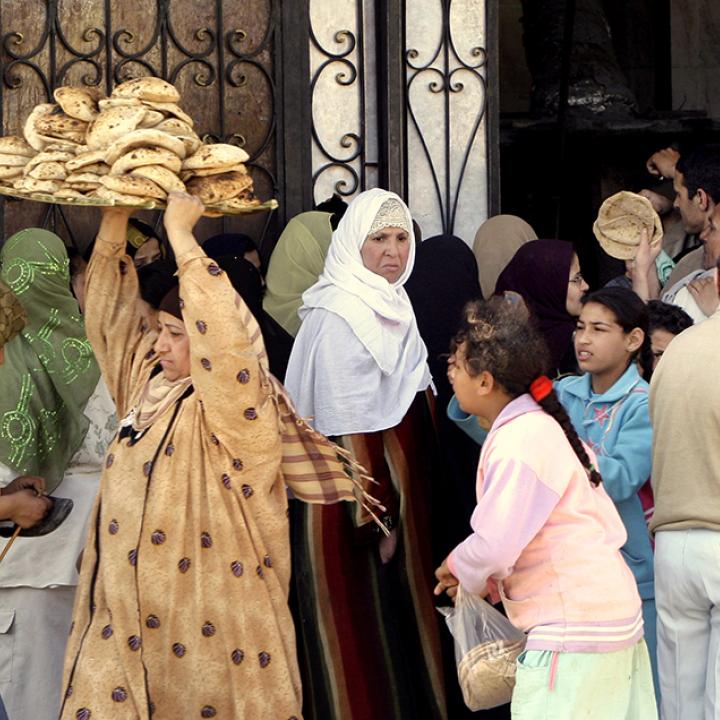

As Egyptian women’s styles have shifted from mid-century to today, the adoption of the hijab is one clearly rising trend on the streets of Cairo.
The British novelist L. P. Hartley once wrote “the past is another country; they do things differently there.” For the lives of Egypt’s women, this could not seem truer. The public image of Egyptian women has changed dramatically in the past forty years. Last year, Foreign Policy published pictures of Egyptian women in 1959 enjoying the sun and sea at an Alexandria resort. The image would be unrecognisable today. During the 1950s and 1960s, the clothing of choice for urban Egyptian women were miniskirts and short sleeve t-shirts. Alexandria, just like Cairo, has seen much of its quintessential cosmopolitan attributes undermined as a result of growing Islamism, which has manifested in the adoption of women wearing the veil, or hijab.
Some suggest that the phenomenon emerged following Egypt's defeat in the 1967 War, which was a source of humiliation for the country and led many Egyptians to fully embrace Islam as a means of gathering national strength. However, according to the writer Tarek Osman, the popularity of the veil took off during the 1970s and early 1980s, as over three million Egyptians travelled to the Gulf in search of work. On their return, they brought back many of the social customs of the region. Within two decades, the number of women choosing to veil rose from thirty to sixty five percent. Today, according to The New York Times, at least 90 percent of women wear the hijab. Film director Yousri Nasrallah noted that the popularity of the veil was not due to "sudden devoutness among Egyptian women," but to "social and economic pressures buffeting the country."
Nevertheless, the country's elite started to embrace the fashion and some pop stars even sung to encourage women to cover their hair. Egypt was once the "Hollywood of the East," but now many actresses prefer to cover their hair and some now refuse to sing and dance on screen. The actress Sabreen, who played the legendary singer Om Khaltum, gave up acting after choosing to wear the veil. Currently, a new satellite channel called Marya is running test transmissions, and is staffed entirely by women wearing the niqab. The channel has been criticized by other media figures, who are unhappy with the idea of not knowing who is talking to them from behind the veil.
Some argue that the veil offers Egyptian women protection and liberates them from unwanted attention. However, even though more women are dressing more conservatively, sexual harassment remains a daily affliction for many women. The Egyptian Center for Women’s Rights found in 2008 that at least 83 percent of Egyptian women were subjected to some form of sexual harassment, and two thirds of men admitted to harassing women. The problem appears to have worsened since the start of the uprising. It does not help that some Muslim Brotherhood deputies such as Azza Garraf have blamed women for their exposure to sexual harassment.
It is clear that for some time, a well of support has existed within Egyptian society for keeping women covered. In 2006, Dr. Suad Saleh, a professor of Islamic jurisprudence at al-Azhar University, received numerous death threats after she announced on a TV show that the niqab is not obligatory as “there is no unequivocal text in the Holy Quran that women must cover their faces.” In the past year, Egypt's Salafis have issued a number of edicts affecting women, including prohibiting women from wearing high heels or trousers unless in the company of their husband or a male relative. The presidential candidate, Hazem Saleh Abu Ismail, announced plans that, if elected, he would force women to wear the veil, and said that Islam makes no guarantees for personal freedom. Even the country’s Coptic community has not been impervious to the currents of Islamism. In mid-May, Bishop Bishoy, who is the secretary of the Holy Synod of the Orthodox Church, recently urged Christian women to dress more modestly by following the example of their Muslim sisters.
However, for the first time in Egypt's modern history, Najla Ali Mahmoud will be the only first lady to wear the veil. President Mohammed Morsi has stated that he will not enact a law enforcing women to wear the veil. Yet it remains to be seen, who or what in this new Egypt will cultivate the moderation necessary to give women the assurance that their personal choices, especially their attire, will be respected. Egypt is a country that needs to address its societal values, and if the country is to go forward and succeed, it needs to encourage female participation in all aspects of public life. In other words, their visible role should not be subject to conditions.


